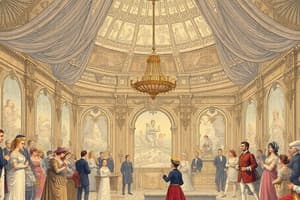Podcast
Questions and Answers
What were some of the causes of the French Revolution?
What were some of the causes of the French Revolution?
- Increased religious tolerance and harmony
- Enlightenment ideas of equality and liberty (correct)
- Industrialization and technological advancements
- Expansion of the French overseas empire
Which event marked the symbolic beginning of the French Revolution?
Which event marked the symbolic beginning of the French Revolution?
- Storming of the Bastille (correct)
- Great Fear uprising in the countryside
- Storming of the Winter Palace
- Execution of Louis XVI
What impact did the French Revolution have on society?
What impact did the French Revolution have on society?
- Introduction of democratic reforms (correct)
- Consolidation of the feudal system
- Promotion of aristocratic privileges
- Enforcement of absolute monarchy
Which key figure was known for his role in the Reign of Terror during the French Revolution?
Which key figure was known for his role in the Reign of Terror during the French Revolution?
What was one significant legacy of the French Revolution?
What was one significant legacy of the French Revolution?
Which key figure played a central role in the execution of King Louis XVI during the French Revolution?
Which key figure played a central role in the execution of King Louis XVI during the French Revolution?
Flashcards are hidden until you start studying
Study Notes
French Revolution
The French Revolution was a period of radical social and political upheaval that occurred between 1789 and 1799 in France. It had numerous causes, including Enlightenment ideas of equality and liberty, economic issues like devaluing currency and rising taxes, and the corruption of the monarchy. During this time, traditional privileges were abolished, feudalism ended, and most famously, the guillotine was used for public executions. The revolution also included many major events such as storming the Bastille, the Tennis Court Oath, their Declaration of Rights, and the nine Thermidorian Reaction.
One result of the Revolution was the introduction of democratic reforms which led to increased competition amongst politicians. However, it is widely agreed that while there may have been new opportunities created by what happened during the French Revolution, these were outweighed by major problems caused by it. In summary, the French Revolution altered the course of history due to its significant impacts on politics, society, and culture. Some key figures involved with the Revolution include Louis XVI, Marie Curie, Jean-Paul Marat, Maximilien Robespierre, Georges Danton, and Jean Pichegru.
In terms of its lasting influence, one can see how the values enshrined in the Declaration of the Rights of Man were adopted into constitutions globally; the concept of national sovereignty became commonplace around the world thanks to the Revolution; and, perhaps most importantly, the idea that regular people could overthrow their rulers spread throughout Europe, inspiring revolutions elsewhere. All told, the French Revolution was a watershed moment in global history, having long term implications far beyond just France itself.
Studying That Suits You
Use AI to generate personalized quizzes and flashcards to suit your learning preferences.




